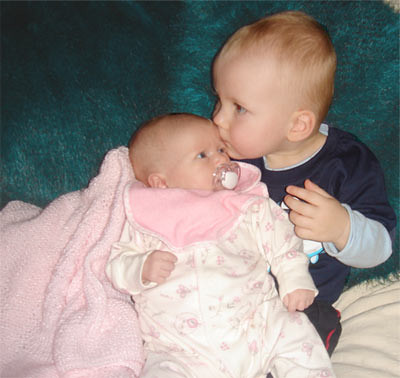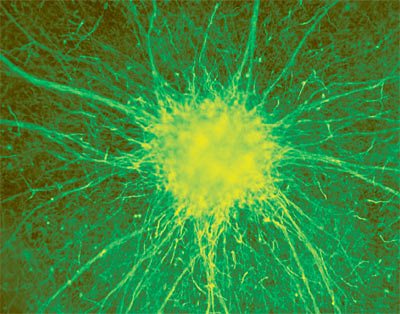The Master Cells
The first time Leanda Guy heard about stem cell banking, she was 10 weeks pregnant with her son Renouard. Fascinated by the idea that stem cells found in her baby's umbilical cord could be used to treat illnesses, the British marketing executive decided to bank Renouard's cord blood after he was born.
"Obviously I hope and pray Renouard will never need his cells," said the 40-year-old mother of two. "However, I am really pleased they are there as an insurance."

Stem cells stored from these children's cord blood may help protect them against future diseases.
Medical professionals are just beginning to unlock the potential of stem cells, which have the ability to change into the cells of other tissues. These "master cells" play an especially critical role in the immune system and have been used since 1988 to treat leukemia and other blood-related illnesses.
In the long run, the hope is that doctors will be able to use stem cells to treat victims of strokes and heart attacks, or those with illnesses like diabetes and Alzheimer's disease. Because the cells can also generate various types of tissue - and have already been used to grow new corneas - scientists are working on developing the technology to grow whole organs.
Cord Blood Banking in Doha
For the past two years, couples in Qatar have had the option of privately banking their babies' cord blood with Cryo-Save, a Netherlands-based company that has been collecting stem cells from umbilical tissue since the year 2000.
So far, about four dozen families here have chosen to bank with the company's Dubai branch - a relatively small number, given the thousands of babies born in Doha each year. For some parents, the high cost of collecting and storing the cord blood for 20 years -13,000 QAR - plays a factor.

But Doha residents will soon have another banking option, as Virgin Health Bank moves its headquarters from the United Kingdom to the Qatar Science & Technology Park. Working with Hamad Medical Center, the company, which was co-founded by Sir Richard Branson of the Virgin Group, plans to create the world's first national stem cell bank.
The public-private bank will store a portion of the child's cells for the family's use and release the rest, with parental permission, into the national public bank for use in the wider patient community. Virgin operates similarly with its European clients by requiring them to make an altruistic donation of a sample from each collection to a public resource.
"It's important that we fill these banks up with as many stem cells as we can..."
For Guy, who banked with Virgin's UK branch, the chance to possibly help others with her son's cord blood served as a big motivating factor. "It's important that we fill these banks up with as many stem cells as we can." she said.
Though Virgin charges a fee for its collection and storage services and details of the bank's alliance with QSTP are still being worked out, HMC managing director Hanan Al Kuwari said the government is considering underwriting the costs of cord blood banking for Qatar residents.
"Our organizations will be working together to develop a program which, we hope, will become the model for the region," she said at a press conference to announce Virgin's move.
Virgin, which is rolling out a pilot program and is supposed to become fully operational by 2010, has received the blessings of HH Sheikha Mozah Nasser al-Misnad and prominent Islamic scholar Yousuf al-Qaradawi. The company plans to eventually open its services to other countries in the area.
Public Education
One of Virgin's first priorities as it sets up shop is educating the population about the benefits of cord blood banking, said Andrew Glen, a company spokesman.
For many parents, the high costs typically associated with cord blood banking are not the only deterrent - a lack of public awareness also plays a role, health officials say.
One of Virgin's first priorities as it sets up shop is educating the population about the benefits of cord blood banking.
One common misunderstanding is confusing embryonic stem cells and cord blood stem cells. Because the latter are collected from fetal tissue that is usually discarded after birth, they are not considered as controversial as embryonic stem cells, which require the destruction of human embryos. Virgin does not deal with these types of cells, Glen said.
Briefing parents on what happens to their child's stem cells once they are collected is also tantamount. Immediately after the baby is delivered and the umbilical cord is clamped, a trained medical professional will collect the blood, which will be cryogenically frozen at a facility being built in Doha. The procedure is painless and takes five to 10 minutes.
Though Virgin deals strictly with the collection and storage of stem cell samples, QSTP may elect to use some of the public samples for research purposes, but only with parental consent, Glen said.
Conversely, Cryo-Save, which operates in 38 countries, is strictly a private banking service, which means the baby's stem cells are for the family's exclusive use. Doctors might recommend this approach for couples who have a family history of certain diseases, said Nawal Souahla, a spokeswoman for Cryo-Save. Another advantage of banking privately is an increased chance of a successful transplant for relatives, who are more likely to find a match in the family, Souahla added.
Parents who elect to use the service can pick up a collection kit from Cryo-Save's Doha office, located next to La Cigale Hotel, before the mother gives birth. The kit can be used at any hospital in Doha.
An Eye on the Future
To date, cord blood banking has been offered mostly by private companies that market the expensive service as "biological insurance" or "a wise investment." That's because the probability of someone needing their own stem cells is currently very small – doctors can only treat about 85 diseases with the cells, and most require a transplant from a healthy donor into the ill patient.
"If you need stem cells therapy today, you're likely to need someone else's," Glen said.
But as the science continues to develop, the expectation is that the number of future applications for stem cells will grow exponentially – because "on the regenerative side, you'll need your own cells," Glen added.
That's why, he said, it is important to bank cord blood for both public and private use. By establishing a large pool of public samples, patients have an increased chance of finding donated stem cells to match their own, similar to a blood type for a transfusion. And a child's own stem cells can serve as an exact match in the event that he needs, for example, a new liver.
The worldwide shortage of matched stem cells makes collecting the cells of minorities especially important, proponents of the QSTP-Virgin alliance say.
"The possibilities are astounding," said Guy, who has banked both her children's cord blood..."They've grown a body part out of it already."
The possibilities are astounding, said Guy, who has banked both her children's cord blood. "What happens normally is that it all gets thrown away, which is such a waste," she said. "The baby is finished with the umbilical cord by the time it's born, and now there's the technology to save these (stem cells).
"They've grown a body part out of it already," she added, referring to a November 2008 breakthrough in which a woman successfully received a trachea transplant that was grown from her own stem cells.
"If they can do that today, what are they going to be able to do in 15 years time? It could save someone's life," Guy said.
For more information on Virgin Health Bank or if you are interested in enrolling in the pilot program, visit www.virginhealthbank.com/qatar
Source: Qatarvisitor.com

No comments:
Post a Comment